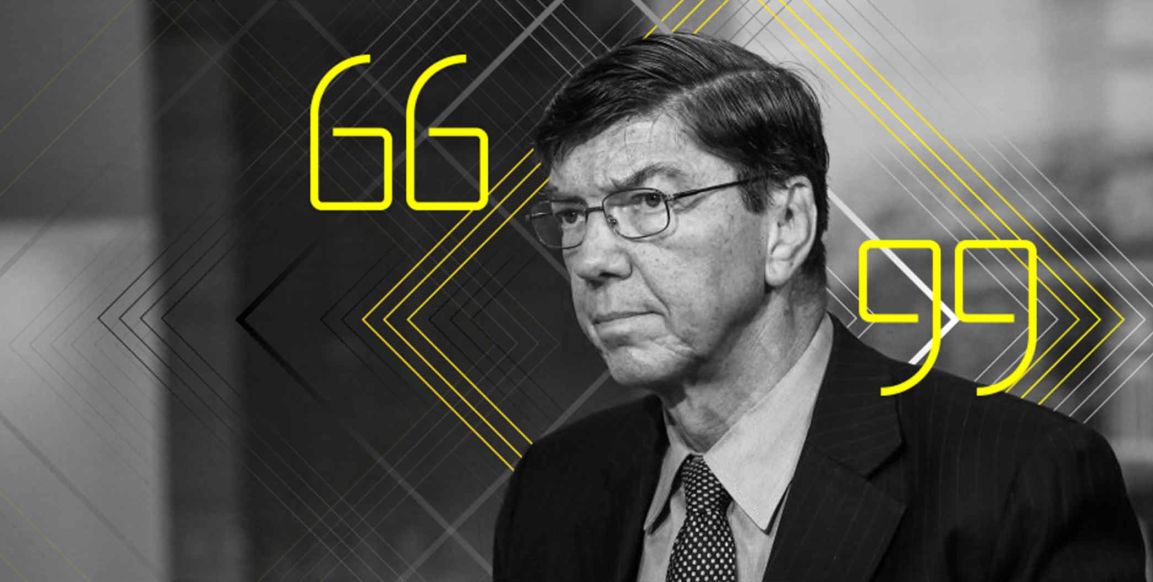
A tribute to Clayton Christensen: ‘godfather of disruptive innovation’
As an inspiration behind some of Nexford’s founding philosophies, we celebrate the life of the man who introduced “disruptive innovation” in 1995
Father of disruptive innovation Clayton Christensen died January 23 at the age of 67.
Tributes poured in from the world’s most prominent business leaders after the Harvard professor and businessman passed away from complications with his treatment for Hodgkin’s Lymphoma.
His book, The Innovative Universityᅠtook his theory of disruptive innovation to the field of higher education, where he and co-author Henry J. Eyring exploded the traditional university model, highlighting online learning as a disruptive technology that will force campus-based colleges to reinvent themselves.
Clayton Christensen and his ideas were fundamental to Nexford University’s founding philosophies.
In a New York Times article in 2013, he compared traditional universities to sailing ships at the beginning of the 19th century. When the first steamships appeared, they didn’t pose much of a threat: They were expensive and couldn’t make it across the Atlantic. So steamships found a foothold sailing up and down rivers until the first steamship sailed from the US to the UK and kicked the sailboat companies into action, who started to make hybrid ships that used steam and sails. But, technology moved fast and soon there was no comparison between sail and steam travel. Every sailing ship company sank.
“Traditional colleges are currently on their hybrid voyage across the ocean,”
said Christensen. “Like steam, online education is a disruptive innovation – one that introduces more convenient and affordable products or services that over time, transform sectors. Yet many bricks-and-mortar colleges are making the same mistake as the once-dominant tall ships: they offer online courses but are not changing the existing model. They are not saving students time and money, the essential steps to disruption. And though their approach makes sense in the short term, it leaves them vulnerable as students gravitate toward less expensive colleges.”
For Nexford professor Cornelis Coetzee, Christensen’s biggest influence came in the shape of his article, How will you measure your life? In it, Christensen extended his concept of disruption to the personal realm, by challenging people to take control of their lives in order to lead fulfilling careers.
“Before I read this article,” says Coetzee, “I viewed Christensen’s work mostly as another business or marketing theory, much in the same way I viewed Vargo and Lusch’s Services-dominant logic – as something to explore. But when his concept of disruption suddenly and perfectly took shape in my mind, it had a profound effect on my approach to my post-graduate studies and academia in general.
“By changing my approach to thinking from why to how, I allowed myself to be disrupted:
against all odds and to great success thus far. Rest well you giant – may your legacy long be practiced!”
Today, many traditional universities have adopted online learning, but they aren’t the ones doing the innovating. Christensen’s theory predicts that people will eventually move to new, disruptive innovations. Already universities are showing the cracks of a broken business model, raising prices and losing customers.
Other traditional universities are frantically launching MOOCs (massive open online courses) in an effort to move with the times, but they’re not disrupting anything yet. Only a few have built MOOCs into their curriculum, and because they’re not offering a solution for people who need low-cost, accessible and relevant degrees, they’re not truly innovating.
Christensen said that the lessons – from many industries – tell us that companies who truly innovate and transform their fundamental model instead of just hooking on parts of a new technology, will have the final say.
“As online learning evolves”, he said,
“Students should be able to customize their experience with what they need and can afford.”
“As concepts and skills are taught far more effectively online, it’s unlikely that face-to-face interaction will cease to matter. Instead, students can arrange for such experiences when it suits the job they need to get done. Given the reality that we all have different learning needs at different times, that’s a far more student-centered experience.”
Find out more about Nexford’s disruptive education

Cornelis Coetzee, born and educated in South Africa, has had a career spanning more than 25 years, working in both industry and academia. In 2012, he won the Faculty of Management Lecturer of Year Award at the Tshwane University of Technology, and is currently working on his PhD Business Management at Nelson Mandela University. He has experience in both contact session, online and distance education.
Join our newsletter and be the first to receive news about our programs, events and articles.